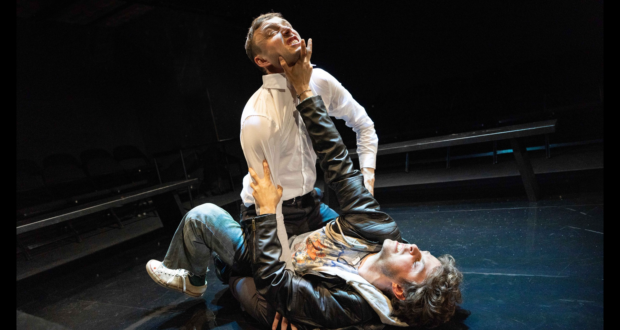A fraught and highly charged drama that unpicks the fragility of memory and storytelling with horrific consequences for those on the wrong end of the “truth”.Summary
Rating
Excellent
Exploiting the intimacy of the smaller auditoria at the Park Theatre, set designer Kit Hinchcliffe has created a perfect setting by which to underscore the menace that lies at the centre of Leaves of Glass. Set in the round, the four actors move in and out of the dark performance space which is marked only by inlaid floor lighting. Their proximity to the audience both when performing, and when entering and leaving, reinforces the claustrophobia of a family environment, creating a distinct sense of unease.
Steven, played outstandingly by Ned Costello, is the eldest of the two brothers. The strongest of the four performances, there is a constant edge to him. It feels as if he is holding something in: like a caged animal, there’s unspent energy, barely controlled but just beneath the surface waiting to erupt. He’s the eldest by 5 years and has kept the family together throughout previous trauma. The inference is that when he divulges his stories and reminiscences, they’re accurate, and therefore to be believed. By contrast, his younger brother Barry is volatile and troublesome. A recovering alcoholic, his anxiety and mental health issues suggest an unreliability of memory. In another strong performance Joseph Potter encapsulates that volatility of mental health, physically leaping about the stage, at times harming himself and potentially others, he is always on the edge of extremes: delirious with potential and excitement or in the depths of anguish. The relationship between the two brothers is perfectly on point: a fraternal co-dependence which facilitates both support and jealousy.
Liz, the boys’ mother (Kacey Ainsworth) and Debbie (Katie Buchholz), Steven’s wife, have their own interpretation of events too of course. Whilst playing supporting roles they nonetheless add to the fluidity of accuracy and expectation. The absence of a father is marked but it takes some time and several accounts for the audience to surmise what has happened.
The play is broken into short fragments of performance, after which blackout allows the actors to leave and enter the stage accordingly. Reinforcing the fragmentation of memory it works, but the constant moving of props on and off stage by the actors is unnecessary and disrupts the flow. In such a successfully minimal setting many of the props are unnecessary, save for the candelabra which when lit showcases the most dramatic and lengthy conversation between the two brothers. This ultimately leads to a shocking revelation and betrayal which, despite hints along the way, is still unexpected.
The dialogue itself is fractious and disturbing. I found it irritating in the way that listening to loud conversation where no one listens to anyone, or picks up on the unreliability of the narrative is. But that’s the point, isn’t it? When we don’t listen to each other, or even consider the truth of a narrative, the effects can be highly damaging.
Leaves of Glass, by Philip Ridley, is a dextrous and ever fluid exploration of the reliability of personal memory and how our stories move and reshape over years. The family dynamic and a desire to present a palpable and forgiving narrative in retrospect mean that stories are told and retold, each time with a subtle change that can completely transpose the hero of the hour. It is both fascinating and horrifying to watch the effects of that as the sharing of a memory manipulates reality to transform the balance of power. Like leaves made of glass, the veneer of truth is easily shattered.
Written by: Philip Ridley
Directed by: Max Harrison
Produced by: Lidless Theatre and Zoe Weldon
Set & Costume Design by: Kit Hinchcliffe
You can read more about this play in our recent interview with Joseph Potter here.
Leaves of Glass plays at Park Theatre until 3 June. Bookings and further information can be found here.
The show also play at Yvonne Arnaud Theatre, Guildford 15 – 17 June and Hope Mill Theatre, Manchester 10 – 16 July.
 Everything Theatre Reviews, interviews and news for theatre lovers, London and beyond
Everything Theatre Reviews, interviews and news for theatre lovers, London and beyond



